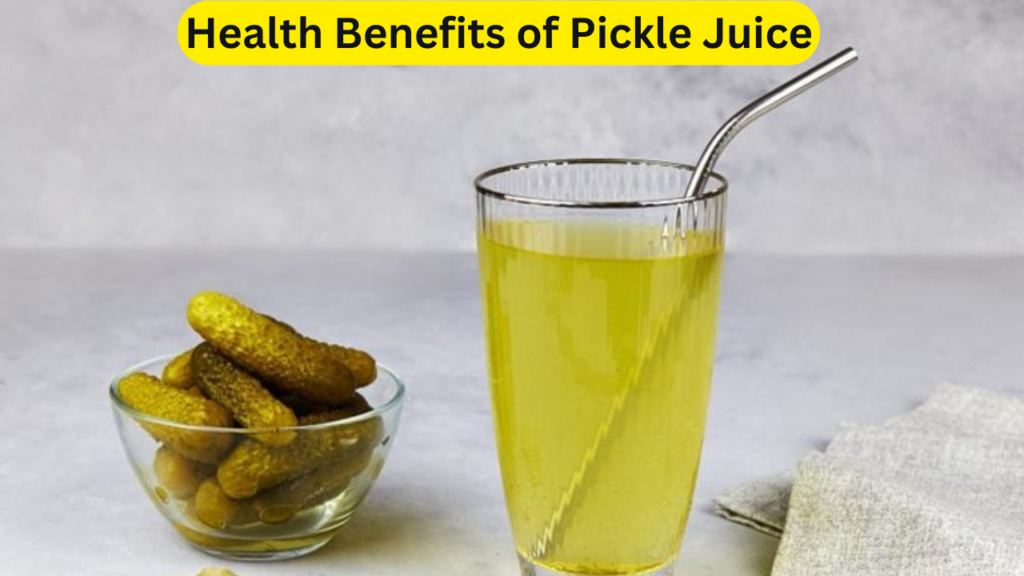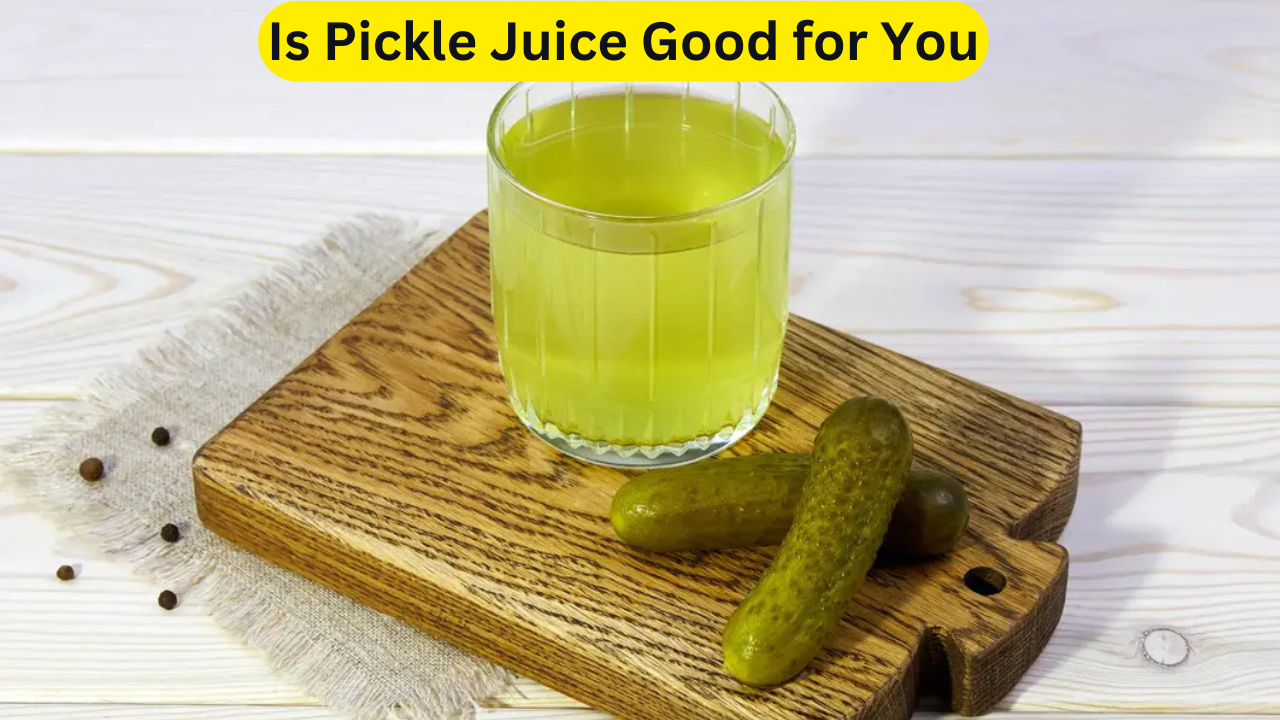Is Pickle Juice Good for You: Pickle juice has garnered a reputation as a health tonic, with claims ranging from improving gut health to aiding in workout recovery. Some people swear by its ability to alleviate heartburn, boost energy, and even curb their appetite. But what’s the truth behind these claims? Is pickle juice really as beneficial as people think, or is it just a salty liquid with no significant health value?
While pickle juice is indeed packed with beneficial components, it is not a one-size-fits-all solution for everyone. Experts, including registered dietitian Beth Czerwony, RD, LD, caution that while pickle juice can offer several health benefits, it should be consumed in moderation. One cup of pickle juice contains about a third of the daily recommended sodium intake, which could be problematic for those on low-sodium diets. However, when enjoyed in small amounts, pickle juice may help improve digestion, enhance athletic recovery, and even help with blood sugar regulation.
Let’s explore the potential health benefits of pickle juice in more detail to understand what it may—and may not—do for you.
Health Benefits of Pickle Juice
Pickle juice may have a reputation for being a quirky remedy, but there are indeed some potential benefits to consuming it. Here are six reasons why you might want to consider adding it to your routine—at least in moderation.
1. Probiotics
One of the primary reasons people turn to pickle juice is for its probiotic content. Naturally fermented pickles (and their juice) contain beneficial bacteria that help promote a healthy gut microbiome. Probiotics are live microorganisms that help balance the good bacteria in your digestive system, aiding in digestion, boosting metabolism, and supporting immune function.
While you don’t have to rely on pickle juice exclusively for probiotics (you can find them in other fermented foods like kimchi, miso, and sauerkraut), it’s a good option for adding a little extra support to your gut health. Look for refrigerated pickles that are naturally fermented, as these contain the most active probiotics. Avoid pickles made with vinegar, as they typically don’t provide the same gut benefits.
2. Exercise Recovery
After a grueling workout, it’s crucial to replenish the electrolytes you’ve lost through sweat. Electrolytes, such as sodium, potassium, and magnesium, are key to maintaining fluid balance in the body. Pickle juice can be a great source of these electrolytes, which is why some athletes use it as a recovery drink.
According to Czerwony, pickle juice contains a higher concentration of sodium, potassium, and magnesium compared to many sports drinks. These minerals help rehydrate the body and restore electrolyte balance, which may aid in faster recovery. However, it’s important to note that pickle juice is quite high in sodium, so it should only be consumed after a particularly intense workout or when you need to replenish lost electrolytes. For most people, excessive sodium intake can be detrimental to heart health, so moderation is key.
3. Blood Sugar Regulation

Did you know that vinegar-based pickle juice might help regulate blood sugar levels? Studies have shown that vinegar can prevent spikes and dips in blood sugar, which could be beneficial for those with diabetes or insulin resistance. Since most pickles are made with vinegar, the juice can provide similar benefits.
This doesn’t mean that pickle juice is a cure for diabetes, but it could potentially help with blood sugar management in the short term. However, keep in mind that you can get the same benefits from other vinegar-based products like apple cider vinegar or salad dressings.
Click Here: Struggling After Childbirth? Try These Postnatal Yoga Asanas for Postpartum Recovery
4. Weight Loss
While pickle juice is often touted as a weight loss miracle, the evidence behind these claims is not as clear. The connection between pickle juice and weight loss is more about the vinegar content in the juice, which may help curb appetite and stabilize blood sugar levels.
As Czerwony explains, “Pickle juice could help curb your appetite by stabilizing blood sugar.” When blood sugar levels are stable, it can be easier to manage your appetite and maintain a healthy weight. However, pickle juice should not be seen as a miracle weight loss solution. For sustainable weight loss, a balanced diet and regular physical activity are key.
5. Hangover Remedy
If you’ve ever had a hangover, you know how important hydration is. Alcohol dehydrates the body, and replenishing lost fluids and electrolytes is vital for recovery. Pickle juice can be a helpful remedy for a hangover because it contains electrolytes like sodium and potassium, which help rehydrate the body.
Czerwony suggests that drinking pickle juice in the morning after a night of drinking may help reduce some hangover symptoms by restoring lost electrolytes. However, the best way to avoid a hangover is to drink in moderation and stay hydrated throughout the night.
6. Antioxidants
Finally, pickle juice may provide some antioxidant benefits. Since pickles are made from cucumbers, they retain some of the antioxidants found in the vegetable. These antioxidants can help protect your body’s cells from damage caused by free radicals, which are linked to chronic diseases like cancer and heart disease.
While the antioxidants in pickle juice are a bonus, eating whole pickles (or cucumbers) is an even better way to get the full range of nutrients. Additionally, a balanced diet rich in fruits, vegetables, and whole grains is the best way to ensure you get enough antioxidants.
Also Read: Mercedes-AMG GT63 Pro: A High-Performance Luxury with Unmatched Features
Is Pickle Juice Good for You Conclusion
Pickle juice may not be the magic elixir that some people claim, but it does offer a few health benefits when consumed in moderation. Whether you’re looking to improve your gut health, aid your workout recovery, or regulate your blood sugar, pickle juice could provide some useful support. However, due to its high sodium content, it’s important to be cautious about how much you consume, especially if you have certain health conditions like high blood pressure.
If you enjoy the briny taste and occasional health benefits of pickle juice, there’s no harm in incorporating it into your diet from time to time. Just remember that it’s not a cure-all, and it should be part of a broader, balanced approach to health.
For those seeking more significant health benefits like improved digestion or electrolyte balance, there are many other options to consider, such as probiotic-rich foods, electrolyte supplements, or vinegar-based products. But for pickle juice lovers, it’s a tangy, savory option that can be a fun and beneficial addition to your wellness routine.
Is Pickle Juice Good for You FAQ
1. Is pickle juice good for gut health?
Yes, naturally fermented pickle juice contains probiotics, which are beneficial bacteria that help promote a healthy gut microbiome. Probiotics support digestion, metabolism, and immune function. However, for the most potent probiotic benefits, choose refrigerated pickles that are naturally fermented, as opposed to those made with vinegar.
2. Can pickle juice help with workout recovery?
Pickle juice can be an effective way to replenish lost electrolytes after a workout. It contains sodium, potassium, and magnesium, which are essential for hydration and muscle function. However, pickle juice is high in sodium, so it’s best to use it as a recovery drink only after particularly intense exercise.
3. Does pickle juice aid in weight loss?
While there are some claims that pickle juice can help with weight loss, the evidence is not conclusive. The vinegar in pickle juice may help curb appetite and stabilize blood sugar, which can support weight management. However, it should not be considered a miracle weight loss solution. A balanced diet and regular exercise are key to long-term weight loss.
4. How does pickle juice help with hangovers?
Pickle juice may help with hangovers by replenishing lost electrolytes and promoting hydration. Electrolytes like sodium and potassium are depleted when you drink alcohol, and pickle juice can help restore them, potentially alleviating some hangover symptoms. However, it’s best to drink in moderation to prevent a hangover in the first place.
5. Is pickle juice high in sodium?
Yes, pickle juice is high in sodium, with one cup containing about a third of your daily recommended intake. While sodium is essential for electrolyte balance, consuming too much can lead to health issues like high blood pressure. Therefore, it’s important to consume pickle juice in moderation, especially if you have a sodium-restricted diet.









